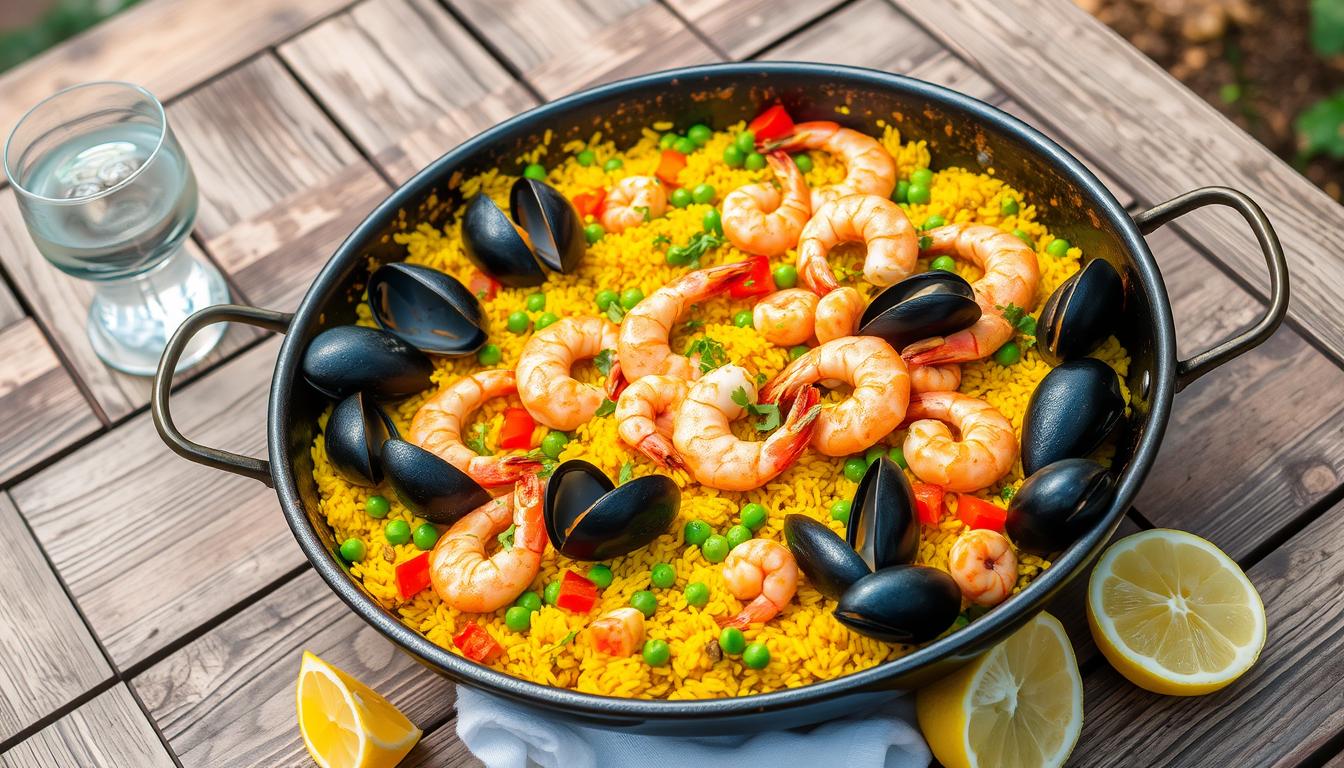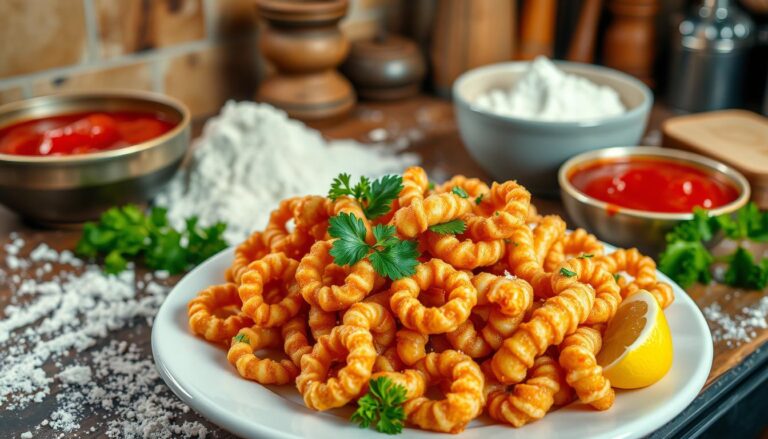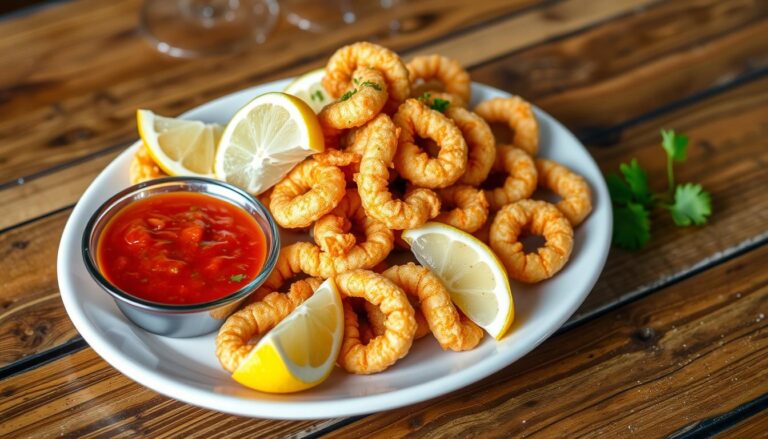Quick Seafood Paella Recipe: Ready in Under an Hour
The smell of saffron and seafood reminds me of my first visit to Valencia, Spain. That evening, I tasted real seafood paella for the first time. It was magical. The dish’s bright colors, deep flavors, and the way it brings people together are unforgettable.
Ever wondered how to make seafood paella like a Spanish chef? You’re in the right spot. This Spanish seafood rice dish might seem hard, but it’s easy to make in under an hour.
Forget about long recipes and prep times. This seafood paella recipe will make your cooking shine. It brings Valencia’s flavors right to your table. With a few ingredients and simple steps, you’ll impress everyone with a meal that tastes like it came from a restaurant.
Table of Contents
Understanding Traditional Spanish Paella
Paella is more than a rice dish from Spain. It comes from Valencia, a coastal area famous for its food. The name “paella” means “frying pan” in Valencian, showing its simple start among farmers.
To get authentic paella recipes, you must understand its roots. Traditional paella was not just about seafood. It was a filling meal made with local foods.
Origins of Paella in Valencia
In Valencia’s green fields, farmers and workers made paella. It was a meal that was both practical and tasty. The first paella had:
- Short-grain rice
- Green beans
- Rabbit
- Chicken
- Saffron
What Makes an Authentic Paella
Making what is paella rice means choosing the right ingredients. Bomba rice, a special Spanish rice, soaks up flavors well. It’s all about using the best local ingredients to truly capture Spanish flavors.
The Significance of Socarrat
“Socarrat is the soul of paella – that crispy, caramelized rice layer at the bottom of the pan.” – Spanish Chef
Socarrat is the best part of paella. It’s that golden, crispy rice at the bottom. It turns a simple dish into a masterpiece.
Essential Ingredients for Perfect Seafood Paella Recipe
To make a true Spanish seafood paella, you need the right ingredients. They add flavor and tradition to your dish. Knowing the key ingredients will make your paella truly special.
Choosing the Right Rice
The base of a great paella is the rice. Bomba rice from Spain is the best choice. It absorbs a lot of liquid and keeps its shape:
- Absorbs three times more liquid than regular rice
- Maintains distinct grain structure
- Creates authentic Spanish paella texture
Seafood Selection Tips
Choosing the right seafood is crucial. Here are some tips for the best results:
- Choose fresh, high-quality seafood
- Mix different types of seafood for complex flavors
- Recommended seafood combinations:
- Shrimp
- Mussels
- Clams
- White fish
The Role of Saffron and Spices
Saffron makes a simple dish into a true Spanish seafood paella. It adds:
| Spice | Contribution |
|---|---|
| Saffron | Golden color and distinctive flavor |
| Smoked Paprika | Deep, rich undertones |
| Garlic | Aromatic base |
“The secret to perfect paella lies not just in ingredients, but in understanding their delicate balance.” – Spanish Culinary Tradition
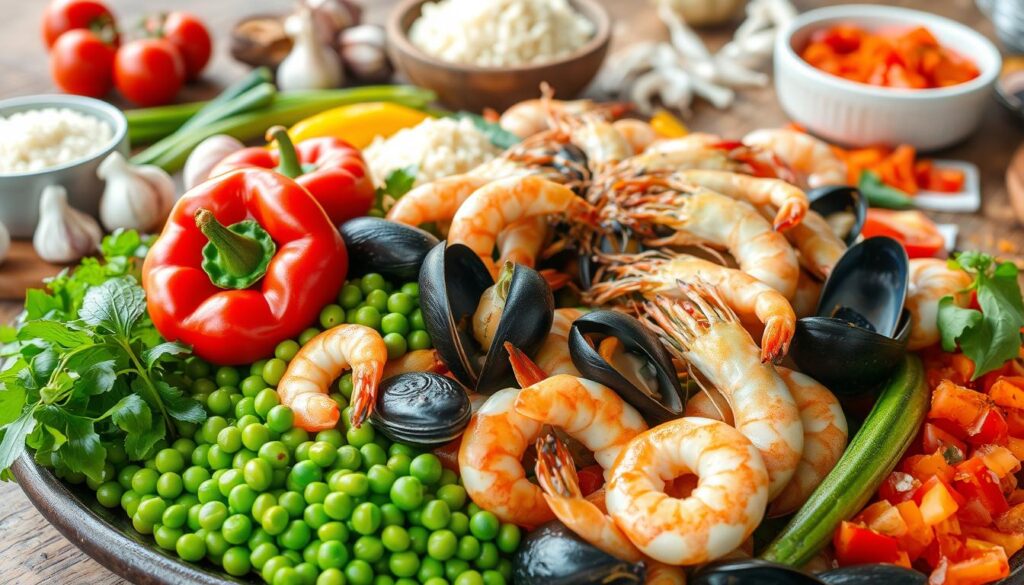
Pro tip: Use fresh, high-quality saffron threads for the most authentic flavor in your paella recipes best.
Kitchen Equipment and Pan Selection
Choosing the right equipment is key for making a true seafood paella. Your pan choice is crucial. A traditional paellera (paella pan) is essential for that crispy rice layer called socarrat.
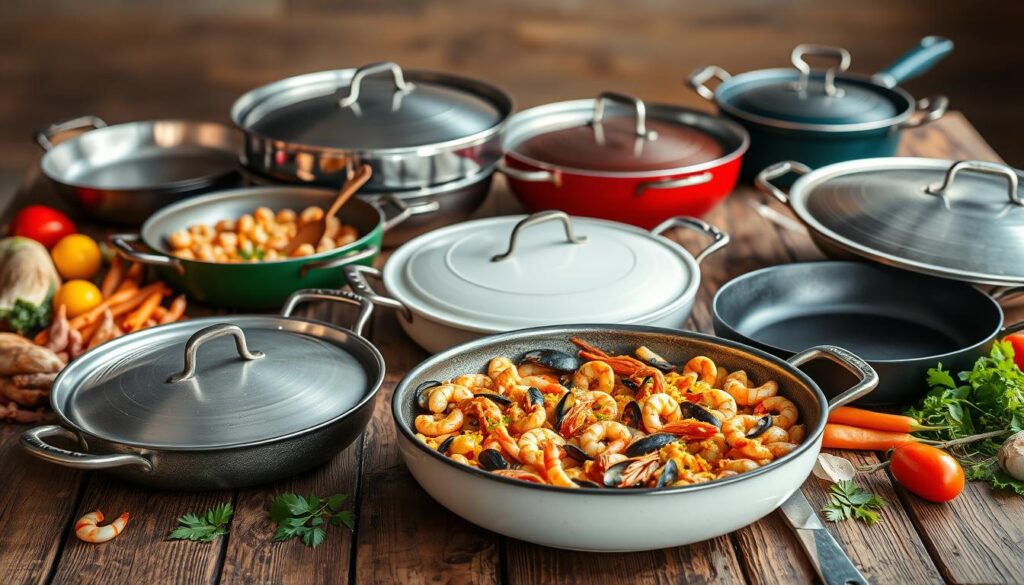
Understanding pan materials is vital when cooking paella. Let’s look at the most common ones:
| Pan Material | Pros | Cons |
|---|---|---|
| Carbon Steel | Excellent heat distribution | Requires seasoning |
| Enameled Steel | Non-stick surface, easy cleaning | Reduced heat conductivity |
| Stainless Steel | Durable, corrosion-resistant | Higher cost, less heat retention |
Pan size is also important. Here are some guidelines:
- 10-12 inches: Perfect for two people
- 14-16 inches: Ideal for 4-6 servings
- 18 inches: Suitable for eight people
Professional chefs suggest a wide, shallow pan. It helps rice cook evenly. The pan’s shape affects the paella’s texture and flavor.
“The right pan transforms a good paella into an extraordinary culinary experience.” – Spanish Cooking Traditions
Quality cookware is worth the investment. It ensures your paella has that authentic Spanish taste every time.
Preparation Steps and Timing
Mastering paella cooking needs precise timing and technique. The best seafood paella recipe requires careful preparation. Understanding key steps is crucial for success.
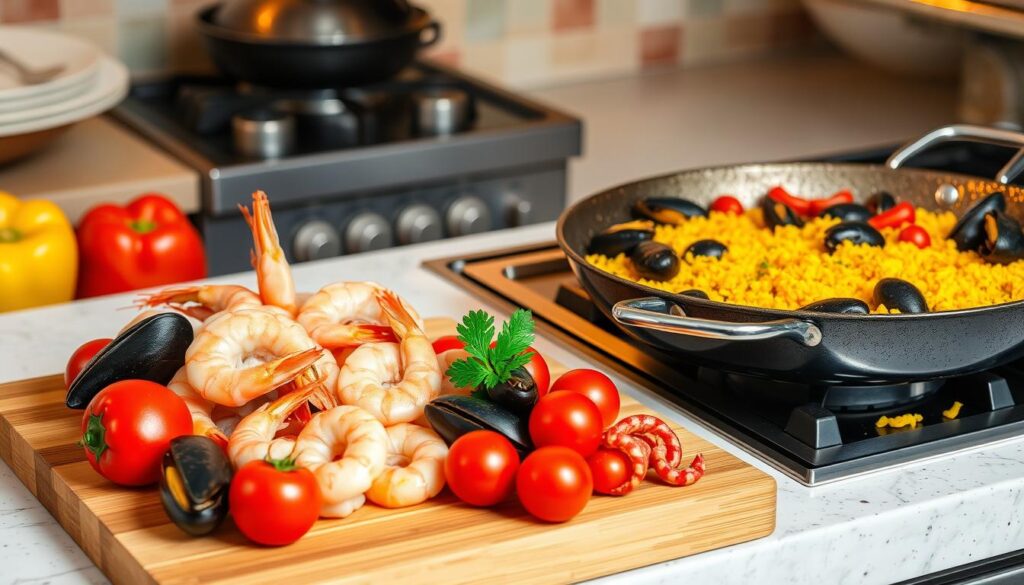
Prep Time Breakdown
Before cooking, gathering and preparing ingredients is key. Here’s a quick prep timeline:
- Chop vegetables: 10 minutes
- Clean and prepare seafood: 15 minutes
- Measure spices and ingredients: 5 minutes
Cooking Time Management
Timing is everything in making authentic seafood paella. Follow this strategic approach:
- Initial high-heat phase: 5 minutes
- Simmering rice: 15-17 minutes
- Final resting period: 5 minutes
Temperature Control Tips
Achieving perfect paella requires careful heat management. Here are some expert tips:
- Start with high heat for initial rice and stock combination
- Reduce to medium-low heat during primary cooking
- Avoid stirring rice to develop authentic socarrat (crispy bottom)
“The magic of paella lies not just in its ingredients, but in its precise cooking technique.” – Spanish Culinary Tradition
Pro tip: Use a wide, shallow pan for even heat and perfect rice texture in your seafood paella.
The Art of Layering Ingredients
Making a true Spanish seafood dish with rice is all about layering ingredients. You need to know how each part works together when cooking.
The base of a great seafood rice recipe is the sofrito. It’s a mix of sautéed aromatics that takes about 15 minutes to make. This layer is key for the whole dish’s flavor.
“Layering is an art form in paella, where each ingredient tells a story of flavor and tradition.”
To add seafood to your paella, follow these steps:
- Begin with firmer seafood like mussels and clams
- Put in shrimp and calamari later to avoid overcooking
- Spread seafood out in the pan for even cooking
For a perfect paella, use 500g of shrimp, 250g of calamari, and 250g of mussels. A tip: Let your paella rest for 5-10 minutes after cooking. This lets the flavors mix well.
| Seafood Type | Quantity | Cooking Order |
|---|---|---|
| Mussels | 250g | First |
| Clams | 200g | First |
| Shrimp | 500g | Later |
| Calamari | 250g | Later |
Creating the perfect Spanish seafood dish with rice takes patience. Each layer adds depth, turning simple ingredients into a work of art.
Mastering the Rice Cooking Technique
Cooking the perfect rice is key for the best paella recipes. The Spanish rice dish needs precision and specific techniques. This ensures an authentic flavor and texture.
Achieving Perfect Rice Texture
Learning how to cook paella starts with rice preparation. The right ratio for Bomba rice is essential:
- Standard water to rice ratio: 3:1
- Hot day adjustment: Increase ratio to 3.5:1
- For 400g rice: Use 1.2-2L of water
Creating the Crispy Bottom Layer
The socarrat – the crispy rice bottom – makes a paella authentic. Professional chefs use these steps:
- Cook rice 18 minutes total
- 10 minutes on high heat
- 8 minutes on low heat
- Optional 90 seconds on high for crispy bottom
“The perfect paella is all about the rice’s texture and that coveted crispy layer.” – Spanish Culinary Expert
Important tips for rice cooking include:
- Never stir the rice after adding
- Ensure rice touches pan sides
- Listen for sizzling sound indicating socarrat
| Rice Type | Water Ratio | Cooking Time |
|---|---|---|
| Bomba Rice | 3:1 or 3.5:1 | 18 minutes |
Mastering these techniques turns an ordinary dish into a Spanish culinary masterpiece.
Seafood Cooking Times and Methods
To make a true Spanish seafood paella, you need to know how long to cook each seafood type. The right seafood can make your dish amazing. So, it’s key to learn about cooking methods.
Here are some important tips for cooking seafood in a piaya rice dish:
- Shrimp: Cook for 8-10 minutes, best added towards the end of preparation
- Mussels: Require 4-5 minutes over high heat
- Squid: Quick cooking, about 2-3 minutes to prevent becoming rubbery
Where you put the seafood matters a lot. It helps cook everything evenly and keeps flavors strong. Each seafood type needs its own way of cooking to stay tasty and tender.
| Seafood Type | Cooking Time | Preparation Tip |
|---|---|---|
| Large Shrimp | 8-10 minutes | Devein before cooking |
| Mussels | 4-5 minutes | Ensure shells open completely |
| Squid | 2-3 minutes | Cut into rings for even cooking |
“The secret to perfect seafood paella lies in understanding each ingredient’s unique cooking requirements.” – Spanish Culinary Experts
Timing is everything in making a real Spanish seafood rice dish. Adding ingredients at the right time stops them from getting overcooked. This keeps the texture and flavor just right.
Common Mistakes to Avoid
Mastering paella cooking needs precision and knowledge. Many home cooks face challenges making this classic Spanish dish. Let’s look at the main mistakes that can ruin your paella-making.
Rice Preparation Pitfalls
Choosing the right rice is key for authentic paella. Bomba and Calasparra rice soak up flavors well and stay just right. Here are common mistakes to avoid:
- Washing rice before cooking, which removes essential starch
- Using incorrect rice-to-liquid ratios
- Stirring rice after adding it to the pan
Temperature Control Challenges
Managing temperature is crucial for paella. Precision is key for this delicate Spanish dish. Keep these temperature tips in mind:
- Start with high heat for initial cooking
- Reduce to medium-low heat while rice absorbs liquid
- Brief high-heat finish to create socarrat (crispy bottom)
Seasoning and Flavor Balance
Getting the flavor right needs careful seasoning. Authentic paella requires a light touch with spices, like saffron. Here are seasoning mistakes to avoid:
- Oversalting the dish
- Using low-quality or excessive saffron
- Neglecting to taste and adjust seasonings
The secret to great paella is patience and attention to detail.
Avoiding these mistakes will help you make a top-notch seafood paella. It will taste like it’s from a Spanish restaurant. Remember, the more you practice, the better you’ll get!
Conclusion
Making a Spanish seafood paella recipe is more than cooking. It’s about creating a special experience that connects you to Valencia’s rich traditions. Your journey through this recipe shows the art of turning simple ingredients into a memorable meal.
Seafood paella is all about flexibility. You can change it up to suit your taste, trying different seafood or adding your own twist to the sauce. Every time you make it, you’re adding your own touch to a classic Spanish dish, bringing creativity and passion to your kitchen.
As you get better at making this Spanish seafood paella, remember that cooking is a journey. Your skills will grow with each try, and you’ll find new ways to make it even better. Share your paella with loved ones, and let it bring warmth and joy to your gatherings.
Embrace the culinary adventure, savor every bite, and enjoy the rich, vibrant flavors of Spain right in your own home.

